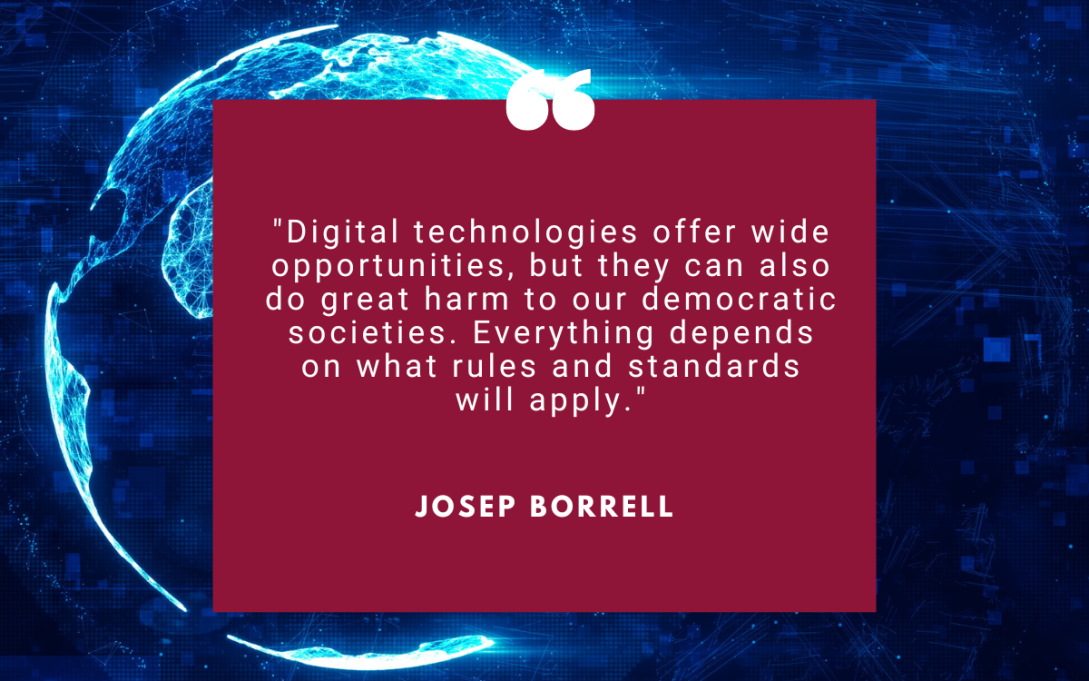Europe’s contribution to the UN Global Digital Compact

Digital technologies offer opportunities for people to live better, freer and more rewarding lives, by bringing us new freedoms, creating new links between peoples and countries and by creating many new jobs. However, we also know they can do great harm to our democratic societies through disinformation campaigns, by silencing dissenting voices, or worse, as weapons for cyber-attacks. With digital, everything depends on how we use these technologies and what rules and standards will apply.
Our digital future is also a geopolitical issue with different digital models competing. Some put the ability of the state to control its citizens at the centre. Others allow powerful private companies to concentrate power in a disproportionate way. We in the EU decided to put individuals at the centre, as empowered citizens. That was the main message of the Council Conclusions on Digital Diplomacy adopted in July last year and the European Declaration of Digital Rights and Principles in December. As a next step, we are now putting forward our ideas for how we and our partners around the world can navigate these tricky waters, in the context of the UN’s Global Digital Compact (GDC).
Multilateralism is in the EU’s DNA and we want to make it as effective as possible. So we were happy to contribute to the work of the United Nations’ Secretary-General, Antonio Guterres, when he called for a ‘Summit of the Future’ to take place in September 2024, to reform the UN and plan how it should operate in the next decades. The UN Global Digital Compact is part of that overall effort and will outline how digital can be part of that.
A human-centric approach
What does the EU want to see in the UN Global Digital Compact? Our core belief is that the digital transformation must be at the service of humans, making sure that human rights and fundamental freedoms they have offline are also upheld online. We want the digital revolution to be about empowering people and giving them new opportunities. A human-centric approach means also standing for a free, open, secure and non-fragmented Internet and against Internet shutdowns. It means fighting information manipulation and disinformation; and committing to protect people’s personal and other data.
Our commitment to putting humans at the centre also means that digitisation must help improve the delivery of public services, including education and health. All people in the world – regardless of their sex, age and disabilities – should have the right to access government services, non-manipulated information. At the same time, we must close the digital divides, to help people acquire digital skills by supporting accessible digital education worldwide and ensure universal connectivity. In other words, the digital transformation will only be successful if it is also socially just, involves everyone and it is a part of a human rights-based transformation.
To deal with accelerating climate change and biodiversity loss, digital technologies can and must play a growing role to provide sustainable solutions. This is also one of the reasons why the European Union launched the Global Gateway initiative. This year we are launching many other flagship digital projects from data centres to cables, from satellites (Philippines COPERNICUS hub connected to ASEAN, Central-Asia satellite connectivity) to terrestrial broadband: submarine cables in the Mediterranean (Medusa), in the Black Sea, around West-Africa and Central-America. These are all implemented by in the spirit of Team Europe, which means joining efforts from EU institutions and member states. As another example we recently launched the EU-LAC Digital Alliance, with the aim to extend the BELLA fibre-optic cable between Europe and Latin America and the Caribbean, to build secure digital backbone connectivity and bring the research communities of the EU and LAC closer together.
An ambitious and forward-looking Global Digital Compact
These days everybody is talking about the revolutionary potential of new technologies like Artificial Intelligence (AI). Their capacities are truly astonishing and they will change our lives in ways we cannot easily fathom. But people also have concerns about what the ethical and other long-term impacts are. As EU, we say yes to the development of AI, but we believe human identity and human dignity must remain at the centre. The UN’s Global Digital Compact can provide essential guidance to guarantee that human identity and human dignity are protected.
Rwanda and Sweden are co-facilitators and coordinate the work around the Global Digital Compact, supported by the UN Secretary-General’s Envoy on Technology. We will support them to get an ambitious and forward-looking UN Global Digital Compact to guide our digital policies for the years to come.
